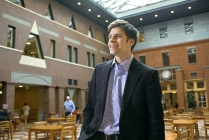COVER STORY SIDEBAR
Overseas scholarships bring the world to Cornell
Anyone who wants to know the value of international scholarships should meet Aadeetya Shreedhar.
Shreedhar will enter Cornell's College of Engineering in the fall as one of the first students to receive a new Tata Scholarship for Students from India.

Marian Heller 11, of Germany, is studying economics and psychology in the College of Arts and Sciences, thanks to Cornell s international scholarship program. See larger image
"There is a maelstrom of emotions coursing through my veins," says Shreedhar. "There is jubilation at the achievement, ecstatic anticipation for the future and surreal pleasure in being able to say that I am a Cornellian."
Or one could talk with Diana Djatsa Sokeng '10, who grew up in Cameroon, where the average annual salary is equivalent to about $4,000 -- a twelfth of what it costs to attend Cornell for one year.
She recalls screaming for joy when she learned, via e-mail, that she would receive a scholarship to attend the ILR School.
Among international students with financial need, however, Shreedhar and Sokeng are the exceptions.
Of the 250 students from outside the United States, Canada and Mexico who applied for financial aid in 2008, only 19 received aid. More than 92 percent were turned down because the university has only a limited pool of funding available for international students. In 2008, that figure was under $2 million.
Brendan O'Brien, director of Cornell's International Students and Scholars Office, says that without scholarship support, Cornell would have great difficulty attracting students from developing countries. Yet bringing students of all nationalities to Cornell can be profoundly powerful, says President David J. Skorton.
"Higher education is one of our country's best policy tools to level the playing field for millions entering an increasingly globalized society and to alleviate inequality and poverty," he says.
Increasing scholarship aid for international students is a component of Far Above … The Campaign for Cornell , which has already seen the creation of two major programs for international scholarships.

Diana Djatsa Sokeng 10, of Cameroon, plans to go to graduate school and hopes to work at the United Nations or World Bank. See larger image
This fall will bring to campus the inaugural class of Tata scholars from India, including Shreedhar. The program is the result of a $25 million commitment from the Tata Education and Development Trust, a philanthropic entity of India's Tata Group. When fully endowed, the fund will support up to 25 students at a time.
Cornell trustee Ratan Tata '59, B.Arch. '62, is the chairman of Tata Sons Limited, the holding company of the Tata Group, one of India's oldest, largest and most respected business conglomerates.
Fellow trustee Martin Tang '70, a Hong Kong businessman, in 2008 created the Martin Y. Tang International Scholarship Challenge. It matches cash gifts and commitments of $750,000 or more, on a $1 for $3 basis, with the goal of creating 12 scholarship endowments of $1 million each.
Students say that coming to Cornell from abroad promotes the exchange of ideas across cultures.
Marian Heller '11, from Germany, is an only child in a single-parent family headed by his father. A scholarship recipient, Heller chose Cornell for its interdisciplinary curriculum -- something he could not find in his home country.
"I'm only in my second year, and I'm taking a graduate-level seminar in the business school," he says. "In Germany you have this very narrowly focused program and few electives."
He is considering graduate study in economics and perhaps later in higher education administration with hopes to perhaps "change the German universities a little bit to make them closer to Cornell."
Sokeng's plans also include graduate school and possibly working for the United Nations or World Bank -- but definitely returning to Cameroon.
"A lot of African students go abroad and never come back because they feel there is no opportunity," she explains. "I hope that I'll be able to go back and do something to contribute to the development of my country, because that is something I have in my heart."